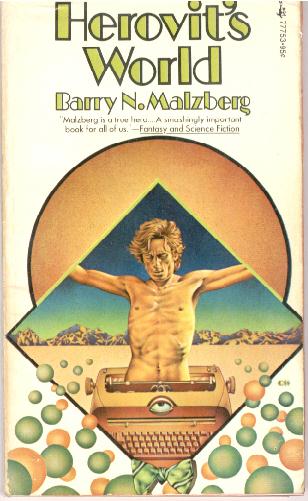

"Malzberg makes what the rest of us do look like felonies!" - Harlan EllisonReview:"There are possibly a dozen genius writers in the genre of the imaginative, and Barry Malzberg is at least eight of them. Beyond Apollo put me out of comission for three days after reading it, Herovit's World destroyed SF cliches long overdue for immolation, and The Destruction of the Temple's effect on me can only be described in terms of the Rape of the Sabine Women...Malzberg makes what the rest of us do look like felonies!" - Harlan Ellison
"Read the book and do your own guessing. This Malzberg is clever....I enjoyed it hugely." - The Alien Critic
In his introduction to the story "A Delightful Comedic Premise" Malzberg writes:
Well, I had never even heard of Wilfrid Sheed, but I'll definitely
try to get my hands on The Hack sometime soon. If it's even a tenth
as good as Malzberg's book, it'll be brilliant.
Rating: We hit jackpot on this one, with a perfect score, 10/10.
Review by Guy Salvidge:
This novel deals with a struggling science fiction writer, Jonathon Herovit, who is trying to write the latest instalment of the Mack Millerís Survey Team serial. If he doesnít complete it soon the publisher will ask for the advance back. The novel he is writing is terrible, and we get frequent excerpts as Herovit completes sections:
"'Someday he would take his revenge upon the Captain and it would be terrible, restoring the balance between them, but it could not be on this expedition, Lothar feared, listening to the hum of the giant engines as tirelessly they brought them ever closer to their destination and the inevitable conflicts which awaited.'"
The poor, grammatically incorrect prose is deliberate, of course, and the text of Herovitís novel is printed in a different font so the reader can distinguish between that and the actual text. Herovitís comment on this section is:
"He simply cannot do this sort of thing anymore."
*SPOILERS WARNING*
Herovitís wife ends up leaving him and he is almost evicted from his apartment. Meanwhile, Mack Miller starts making appearances in Herovitís life, so the boundary between Herovitís novel and his real life, which is a novel, becomes blurred. In this way, Malzberg is asking us to question the boundaries in our own lives between fiction and reality. The Ultimate Guide to Science Fiction called the book: "not really sf, itís a typical Malzbergian angst trip and itís very much about the genre."
I will make no claim to this being Malzbergís best novel (I have, as
yet, read no more than 10 of his books) but its popularity is well-deserved.
To think that this novel is not in print (The
Passage of the Light notwithstanding) raises serious questions about
the integrity of the genre which has treated Malzberg so poorly.